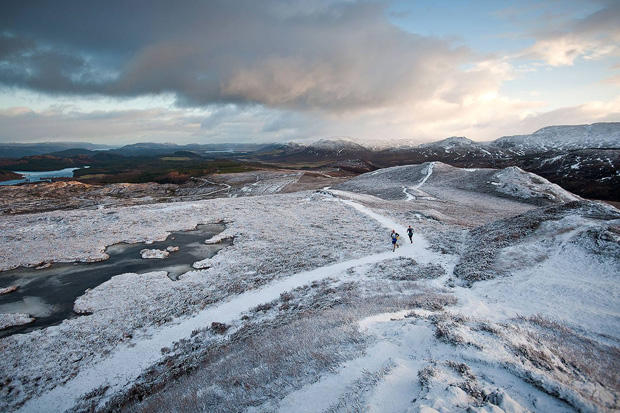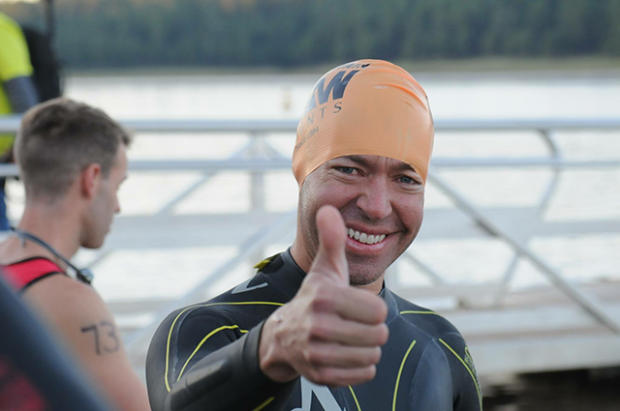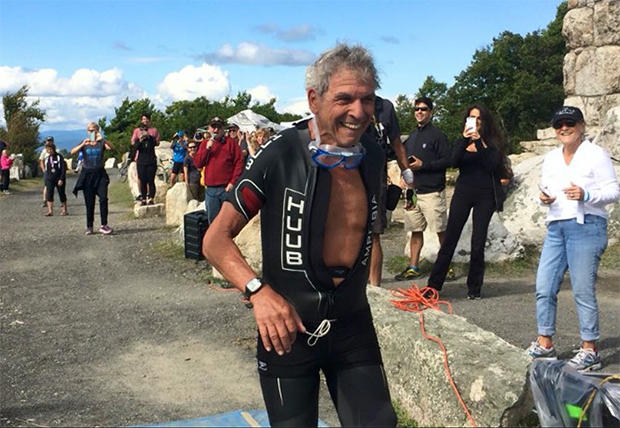Now here is an Intense One
Brian Smallwood has the screen name IntenseOne on Slowtwitch and he currently leads the 100 Runs in 100 Days Challenge on day 90 with 168 runs, and day 90 is not yet over. There are actually 7 others who have already gone past the 100 runs mark but the next closest person is 31 runs behind IntenseOne.
But Californian Brian Smallwood is not just running because of this Challenge, he actually did about 66 workouts in the last two weeks and spent 62 hours training. This 63-year old is retired, but that is still a massive number – at any age.
I chatted with IntenseOne to learn more about him.
Slowtwitch: Well thank you for you time Brian.
Brian Smallwood: Thank you, I will try my best to not be too boring!
ST: I especially appreciate this time since you apparently spend a ton of time doing aerobic workouts. Is there actually time for anything else?
Brian: Being retired is a big help, especially not having a commute to deal with, which is a lot of time and stress I don’t have to deal with. Besides training, which I greatly enjoy, I coach a masters swim group twice a week, and coach a triathlon club at CSUCI (go Dolphins) and oversee some investment properties. But I get a huge amount of help from my wife Sharon, who willingly gives me some slack when I fall behind my on my “honey do list”.
ST: What was your job before retirement?
Brian: My last corporate job was as Director of Engineering and New Product Development for a company involved with semi conductor processing tools. Most of my career was involved in areas of operations management and logistics, and I doubled up by teaching courses in operations and logistics courses for local universities at night. I was typically able to manage about 20 hours a week even with that work schedule.
ST: And are there no other interests that keep you occupied?
Brian: I am always drawn to trying to understand how things work, and how to make them work better. It seems like there are a never ending lists of things to work on with my home. I love to do clinics and workshops and have particularly enjoyed putting on “triathlons” for kids still on training wheels for the local Park and Recreation department. And I enjoy traveling, seeing new things, and meeting new people.
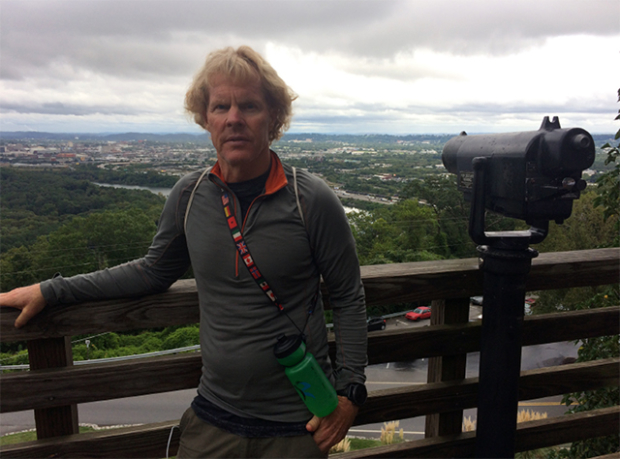
ST: How many races do you do a year?
Brian: Currently I typically race 8-10 triathlons a year, plus a few swim and or running races. This has been a big reduction from my younger years when I raced 20 – 25 a year.
ST: And how long have you been active like this?
Brian: I grew up in a very small house with a large family, and am the middle child of 5 brothers and 1 sister, and have always been very active. Under twelve I was involved in whatever sport the season brought, in Northern California at that time mostly football, baseball and basketball. After twelve I added age group swimming and wrestling. High School was swimming, wrestling and water polo. College was wrestling, club soccer and running (for training). After college I played in multiple soccer leagues, and added tennis and racquetball, often doing tournaments in 2 or all 3 on the same weekend! I was finally talked into doing a triathlon at 39 years old. I had not been swimming since my final meet at age 18, I had never ridden a bike for anything beyond commuting, and I had never done a running race! For the next several years I just added triathlon to my soccer, tennis, racquetball schedule, eventually dropping those sports to occasional fun diversions and focusing on triathlon.
ST: Last year was rough?
Brian: Last year was a difficult year. I had a plan to start slowly and build fitness for Ironman Canada. Things were going well, until I had a very severe dog bite on my right calf while doing a warm up ride 2 days before 70.3 Santa Rosa. It was a very hard and deep bite. The bruising and scars did not clear up for almost 6 months. During this time, I had a very difficult time running, and developed compensation injuries that nearly prevented me from running at all. I could only handle runs of a mile or 2 and my leg would tighten up, and for some reason my feet would get incredibly sore. I was able to endure a very painful ½ Marathon at 70.3 CDA to hold onto 3rd (1st across the line in rolling start format) and earn a slot to the 70.3 WC in Chattanooga, which was my preseason goal. I was not able to run properly until after I took most of October and November off.
ST: Did you enjoy Chattanooga itself?
Brian: I knew that my fitness was not good enough to be competitive at Chattanooga, so it was easy to relax and enjoy a great vacation with Sharon. I made several new friends who I still keep in touch with, and was very impressed with city and surrounding area. The Aquarium, Cloudland Park, Ruby Falls, great restaurants, easy public transportation- really fun city, and will definitely go back.
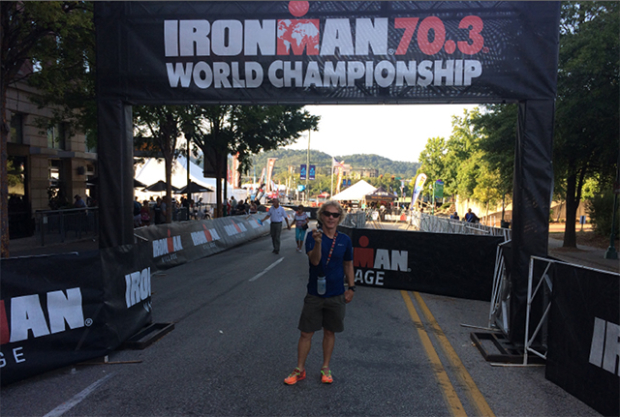
ST: Looking back over the years, what athletic feat of yours do you cherish the most?
Brian: That is a tough question. Ultimately, I would go with Kona 2010. In late 2009 I landed hard on a rock during a training run. At the time it happened I was pretty certain I had fractured something, over the years, particularly when wrestling, I have fractured or broken a lot of bones. As usual, for me, my reaction was to ignore it. It was quite painful to run on, but I was training for 2010 IRONMAN St. George, and refused to be deterred, hoping it would just go away. By March it was only getting worse, and with St. George only 8 weeks away decided to see a podiatrist. The fracture was confirmed and I was told I couldn’t run for 8-10 weeks. I only had 1 question for the doctor “If I run will it get worse?” He said it would be too painful to run, but it was as bad as it could get, so no further damage could be done. Having run in pain for over 5 months, only 8 more weeks somehow seemed a good option. My plan at St. George was all in on swim and bike, and manage the run. I had 1 small issue on the bike, my foot felt fine as long as I wasn’t doing hard climbs, so that did not work out so well. I was fortunate to come off the bike with a good lead, but a very sore foot to start the run. Ultimately I hobbled in with 3rd place and got the slot. I did a complete shut down with lots of therapy for the next 7 weeks, and the stress fracture had fully healed. A week later here was a convenient local Olympic distance Tri that I decided to do to gauge where I was in regard to fitness. I had a better race than expected, finishing 3rd. After the race I was helping with tear down and clean up, and had a stroke! The ambulance had left the site about 5 minutes earlier, but was back quickly and off to the hospital I went. Over the next 10 weeks I under went every test, scan, etc as a massive debate was going on between the neurologists and cardiologists. The cardiologists won out and I was diagnosed with a PFO, a small heart defect that occurs in 1 of 5 humans, but of the 1 of 5 only 1 of 1000 have a large enough defect to allow clots to pass from lower extremities to the brain. Exactly 12 days before Kona I had a surgery at UCLA to close the defect. I had been badgering my cardiologist for weeks about going to Kona, and after the procedure he said I could do whatever I wanted, as long as my heart rate did not exceed 115, and no exertions greater than lifting 25 lbs. (so, you say I have a shot!). I already had flight and lodging, and of course our athlete friendly WTC stuck firm with no roll overs, so the plan was to go over, try a few tests in the water and on the bike, and let my wife decide. On the evening before the race, she gave me permission with the promise from me that I would not under any circumstance exceed the doctor’s limitations. This created an entirely new challenge for me, so I was determined to just relax and have fun, and go as long as I felt good.
I started the swim about 100 yards behind the pack, then waited a full minute after the canon to go, nice, slow relaxed full catch up for the next hour and twenty five minutes. I had the longest and most fun transitions in my life, about 25 minutes each. Palani was the 1st big challenge, I had practiced and knew I could do it, but race days, even when you are site seeing are always different, but I made that easier than I thought, topping off at 109. Generally in a race, I am very narrowly focused, but in this case I noticed everything. It was not long before I got my first experience of back of the pack, it was an amazing experience. Going up to Hawi was very strange, there was a strong head wind- no surprise, and I was progressing at about 4 mph, keeping my HR just under 110 (my self imposed target). This was the only time I had serious doubts about continuing. I was riding at such an easy effort, there was a huge temptation to just go a little harder, who would know!! Well, I would know, and my wife would know as I tell her everything- and the image of my doctor standing over me saying “I told you so” while preparing for the full open heart surgery that would have been needed if something went wrong, was enough to prevent me from losing the debate. How many people know that at the biggest race in the world, they pack up the aid stations on the bike while riders are still on course, well under projected cut off? If you stop and get off your bike, they will at least get you what they can.
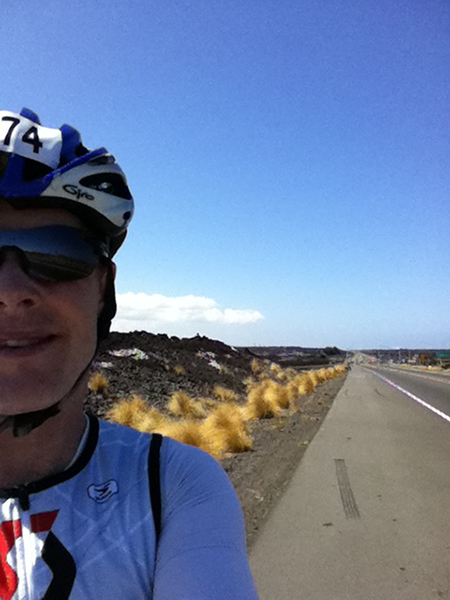
The run was relatively uneventful. I ran until my HR hit 110, then walked until I recovered to 90, for around 6 hours! Two moments of note, after the out and back on Alii drive I saw my wife, so crossed over on the course to give her a hug and kiss, then got yelled at for still going, and had a course marshal threaten to DQ me for the cross over! Yikes! The other was the finish, initially it was thought I would be the last finisher, and I received my first, and likely only, complete rock star moment. The cheering was deafening the entire stretch of Alii, it was a moment I will never forget.
So, at 16:52:08 I crossed the line, and promptly when to the med tent with the worst blisters I have ever had.
ST: Was there someone who finished behind you?
Brian: Yes, ultimately there were 2 more finishers. I think the last one was 16:58.
ST: Where does the total smashing of the competition in the 100 runs in 100 days Challenge on ST rank?
Brian: I cannot put my mind around this being a competition. Prior to even knowing about this challenge, I had planned to run daily doubles for the first 3 months, as a way to build mileage and prepare for IM Canada this summer. The challenge did provide some extra motivation on the occasional days I just wasn’t feeling it!
ST: Your screen name is IntenseOne, but it apparently has nothing to do with obsessively training and racing. Or does it mean more than one thing to you?
Brian: it was actually a shout out for Intense Bicycles, who built my first full custom tri bike frame. Fantastic builder. Coincidentally, if you asked people who know me for one word to describe me, you would likely hear intense often. I would describe myself as determined.
ST: Would you have run a similar amount the last couple months if there were no such challenge?
Brian: I don’t think the challenge has been an influence. My plan before knowing about the challenge was doubles for the first 3 months, with approx. 1.5 hours a day in January, 2 hours in Feb, and 2.5 in March. That is basically what I have maintained. April through June I will do longer singles, up to 30-35 miles, and less doubles.
ST: The other day when I checked my numbers in the training log I saw that you had done 35 workouts in 7 days. That averages out to 5 a day.
Brian: I have never really considered the number of workouts. The last 2 weeks I have had my highest volume, at 30.5 and 31.5 hours, which is about the most I can do enjoyably, and without my life falling apart.
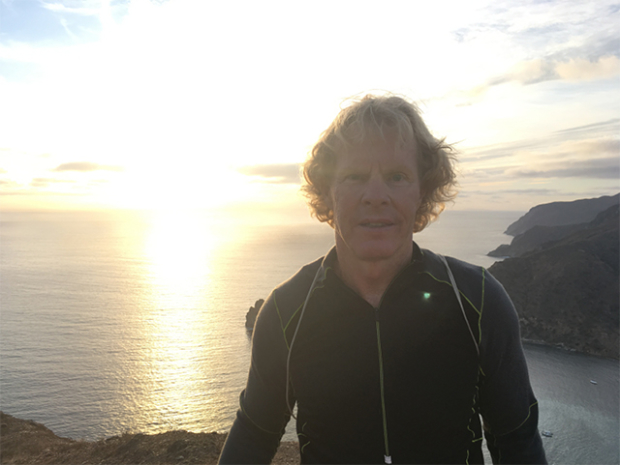
ST: It sounds like you need to pull a Pro card.
Brian: Ha ha, most people who know me think I should be pulling on a straight jacket! I have a fairly good sense of my abilities and limitations. I would rate myself a top 5% guy in the genetic lottery, who can work hard enough and smart enough to compete with the top 2-3%, but Triathlon Pros are mainly top 1%, so…. I did actually race in 2 of the 3 Ironman events done by Simon Lessing, and beat him in both, so there’s that! BTW- it is not because I was super fast.
ST: How many rest days do you take in a month?
Brian: I rarely take full stop rest days, but I take many rest days by running, riding or swimming at a very relaxing pace. This is a habit that goes back at least to 4th grade!
It is important to keep my current volume in context with my overall year. I am coming off of a significant rest period in which I do no scheduled training in October and November. Not no activity- just nothing scheduled and always fun. December was a get started slowly month. I had already planned a higher focus on running for the first 3 months, with double runs daily. I find doing 2 runs with recovery between easier than I longer run, and it helps me improve my efficiency by reducing fatigue within the run. April and May will have more single longer runs, and runs at higher intensity. As the intensity increases, the training hours will reduce. My planned peak fitness will be mid June to mid August, and then I will start the whole thing over again trying to eliminate things that did not work and incorporate some new things starting in November
ST: What big events are on schedule this year?
Brian: Current race calendar includes 70.3 Oceanside, 70.3 St. George, IM Canada and 70.3 Santa Cruz. I will go on record now, and state for the record, that if I qualify for Kona in Canada, I will not take the Kona slot – this year!
ST: Is there anything else we should know?
Brian: I do this because I enjoy doing it. I know that I could maintain my current high level of fitness on as little as 10 hours a week, or a max of what I am currently at of 30ish.
I try to keep things pretty simple, and am not really much of a gadget guy. I always have a plan for tomorrow, family and friends always come 1st, then work (coaching, teaching, earning a buck, etc), then me, which is my training. I always have at least 6 planned workouts, with 3 as priorities, and the others, if time and my body permits. The specific intensity and duration of the training is a start of the workout decision, always based on how my body is responding. I believe this is extremely important if someone trains at higher volume, doing things just because a plan told you to can often be a very bad idea.
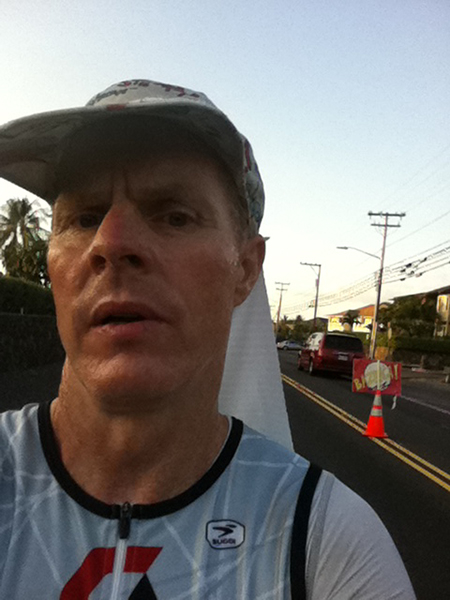
Over 63 years, I have done a lot of sports, and been fortunate enough to do very well at most. The thing I cherish most about Multisport and Triathlon is the sense of family, the feel of competing with, not against others. I have made a tremendous number of friends along the way, and am a far better person for it.
I will toe the line, and complete Kona at 100-years old – no question! I promised my wife that it will be my last, so I have to consider my next sport.


